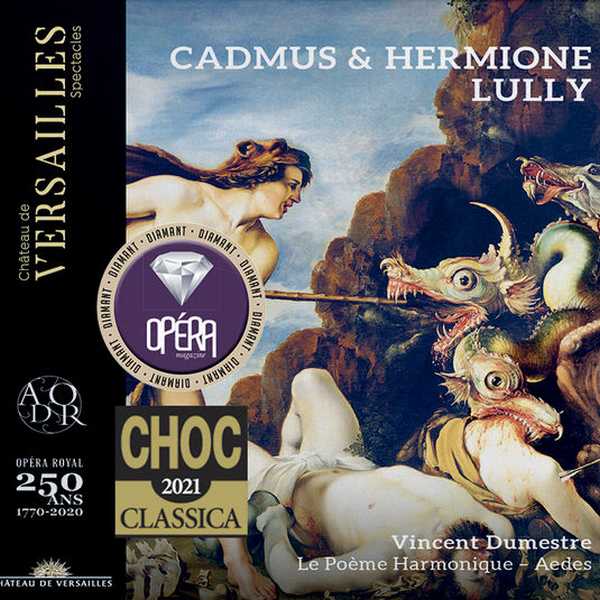

Composer: Jean-Baptiste Lully
Performer: Le Poème Harmonique
Conductor: Vincent Dumestre
Number of Discs: 2
Format: FLAC (tracks)
Label: Château de Versailles Spectacles
Catalogue: CVS037
Release: 2021
Size: 2.23 GB
Recovery: +3%
Scan: yes
CD 01
01. Ouverture
Prologue
02. «Hâtez-vous»
03. Les paysans «Que chacun se ressente
04. «Quel désordre soudain!»
05. «C’est trop voir le soleil briller dans sa carrière»
06. Gavotte en rondeau
07. «Chassons la crainte qui nous presse»
08. «Ce n’est point par l’éclat d’un pompeux sacrifice»
09. «Profitons de beaux jours»
10. «Heureux qui peut plaire»
11. «Peut-on mieux faire, quand on sait plaire»
Acte I
12. Ouverture
13. Scène 1 – «Quoy, Cadmus»
14. Scène 2 – «Où sont nos africains?»
15. Scène 3 – «Cet aimable séjour»
16. Scène 4 – Chaconne
17. Scène 4 – «Il est temps de finir ma peine»
18. Scène 5 – «C’est trop l’abandonner à ce cruel supplice»
19. Scène 6 – «Où vas-tu téméraire?»
20. Scène 6 Chaconne
CD 02
Acte II
01. Scène 1 – «Charite, il est trop vray»
02. Scène 2 – «Quoy! Dès que je parais, tu fuis au même instant?»
03. Scène 3 – «Il me quitte, l’ingrat»
04. Scène 4 – «Je vais partir, belle Hermione»
05. Scène 5 – «Amour, voy quels maux tu nous fais»
06. Scène 6 – «Calme tes déplaisirs»
07. Scène 6 – Les statues d’or sont animées par l’Amour
08. Scène 6 – «Cessez de vous plaindre»
09. Scène 6 – Les statues d’or se remettent sur leurs pieds-d’estaux
Acte III
10. Scène 1 – «Tu détournes bien tes regards?»
11. Scène 2 – «Acquittons-nous des soins où Cadmus nous engage»
12. Scène 3 – «Où vas-tu?»
13. Scène 4 – «Le Dragon assouvy de sang et de carnage»
14. Scène 5 – «Quoy l’espée à la main!»
15. Scène 6 – Marche pour le sacrifice
16. Scène 7 – «C’est vainement que l’on espère»
Acte IV
17. Scène 1 – «Voicy le Champs de Mars»
18. Scène 2 – «Cadmus, reçois le don que je viens t’apporter!»
19. Scène 2 – Air pour les Combattants
20. Scène 3 – «Arrestons un transport funeste»
21. Scène 4 – «Non ce n’est point assez»
22. Scène 5 – «Cadmus ferme les yeux»
23. Scène 6 – «Ma Princesse!»
24. Scène 7 – «Dieux! Je ne vois plus Hermione!»
Acte V
25. Scène 1 – «Belle Hermione, hélas»
26. Scène 2 – «Tes voeux vont estre satisfaits»
27. Scène 3 – «Que ce qui suit les Loix du Maistre du tonnerre»
28. Scène 3 – «Venez, dieux des festins»
29. Scène 3 – Air de Comus et sa suite
30. Scène 3 – «Amants, aymez vos chaînes»
31. Scène 3 – «Après un sort si rigoureux»
Jean-Baptiste Lully’s Cadmus & Hermione of 1673 was arguably the first true French opera, telling a tragic story (Lully and his librettist Philippe Quinault called it a tragédie en lyrique), employing Italian-style recitatives, and collecting the varied music and dance forms of Louis XIV’s opulent court into a coherent narrative that at once celebrated Louis (he is conflated with Cadmus of Thebes) and moved beyond the ceremonial nature of earlier French dramatic music. It’s a sprawling work, with five acts, an overture, and a sizable Prologue with its own overture; highlights include a dragon that eats Africans, a monster snake, and a full complement of Greek gods and goddesses. Realization of the work has, until now, been beyond the means of early music performance groups, and this is the world premiere recording of the opera, made in 2019 and based on a 2008 performance at Versailles Palace by some of the same performers. The leader is Vincent Dumestre, conducting the Le Poème Harmonique orchestra and the vocal ensembles Aedes. The forces are large enough to capture the splendor of the music (thankfully, no one-voice-per-part techniques here), and Dumestre is alert to the huge variety of musical devices Lully brings to bear on his story; there are dances, big choruses, bagpipes, and much more. Cadmus & Hermione may be a difficult work to bring to life for modern audiences, but Dumestre keeps things moving along and probably comes as close as anyone could. Of course, anyone interested in the life of the French court in the 17th century will find this an essential acquisition that will keep giving and giving.